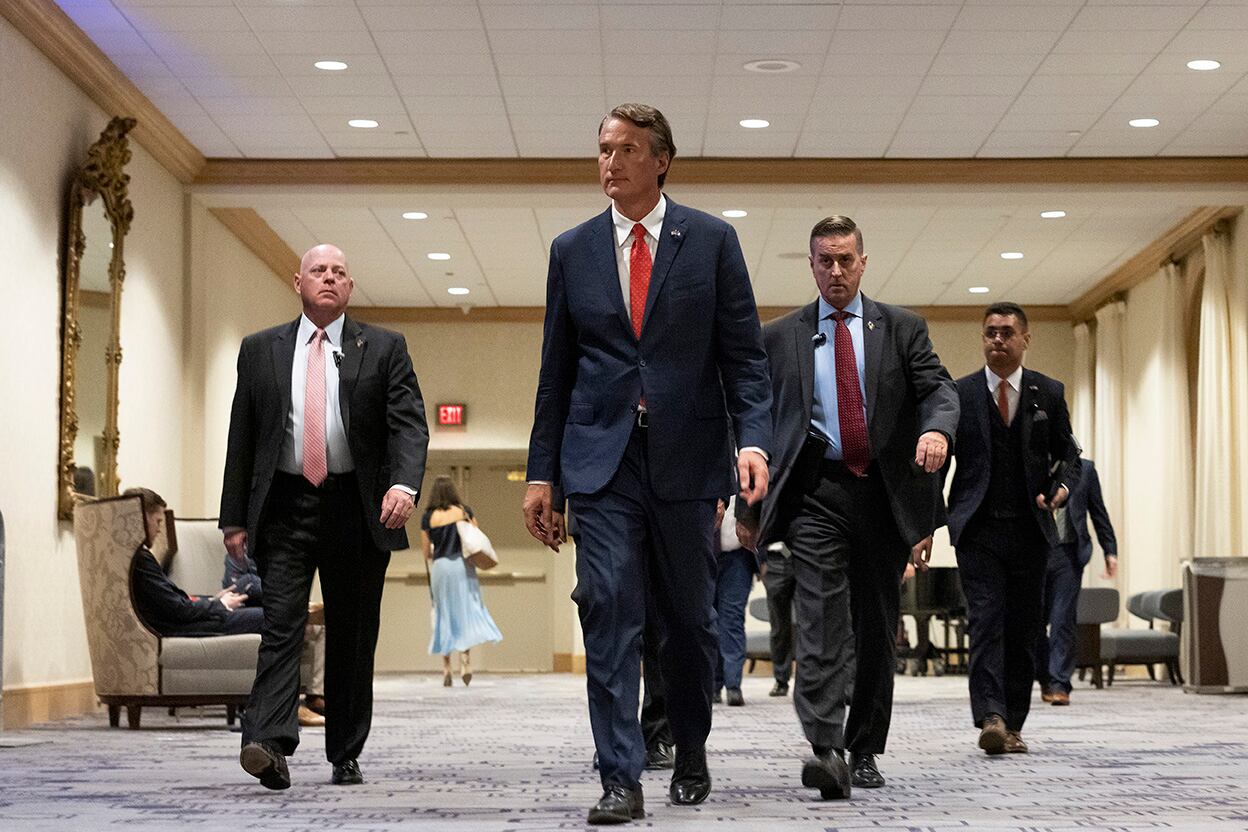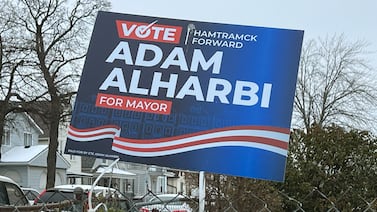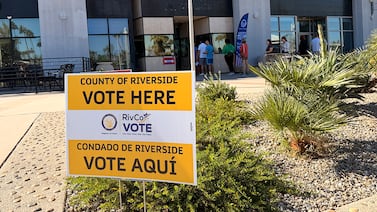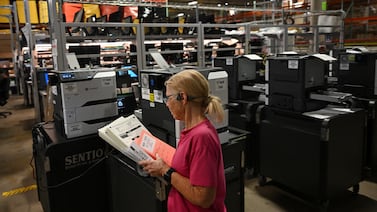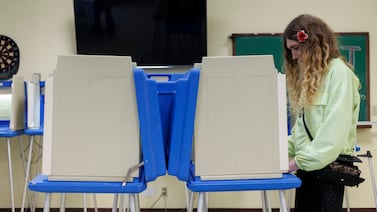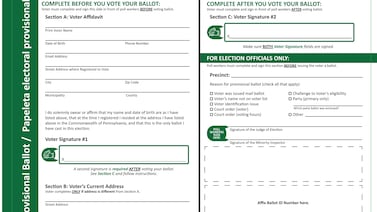Votebeat is a nonprofit news organization reporting on voting access and election administration across the U.S. A version of this post was originally distributed in Votebeat’s free weekly newsletter. Sign up to get it delivered to your inbox every Saturday.
You may have been following the news out of Virginia, where Gov. Glenn Youngkin’s administration recently acknowledged removing thousands of voters from the rolls who shouldn’t have been purged.
There’s a major state election there next week that will determine control of the Legislature Although Youngkin, a Republican, says the affected 3,400 people have had their status restored, advocates say the damage is done, his administration has been cagey about how the removals occurred, and revised the estimate of how many people were affected upwards to the point where they can’t trust the numbers. Initially, Youngkin’s administration said that only 275 people had been affected.
It’s hard to know much about how this happened — despite the election next week, Youngkin hasn’t offered any real transparency or explanation. What we do know is that it was a flawed attempt to rid the rolls of people who’d committed a second felony since having their rights reinstated (though, it’s still unclear if that is actually a problem). Youngkin’s staff says that a data-sharing issue led to these individuals — all of whom had committed probation violations, which would not affect their civil rights — being wrongly removed.
This botched job follows quite a lot of changes Youngkin has made to the rights restoration process in Virginia, generally. In Virginia, people convicted of a felony automatically lose their civil rights — the right to vote, the right to run for office, the right to carry a firearm and the right to serve on a jury. The governor, and only the governor, has the discretion to restore these rights (except firearm rights, which must be restored by a court). Virginia is the only state with such a process, and administrations immediately prior to Youngkin’s had opted to more or less automatically restore these rights. For his part, Youngkin decided each case must be individually reviewed.
The numbers resulting from Youngkin’s change in procedure are stark.
Former Virginia Gov. Terry McAuliffe’s administration restored rights to more than 170,000 during his term. Former Gov. Ralph Northam came in at over 125,000. Both are Democrats. Since he took office in 2022, Youngkin has restored the rights of fewer than 5,000 people in two batches: His first batch — under Northam’s previously established practice — led to the restoration of the rights of about 3,500 people. His second, under his new system, restored the rights of only 800.
It is in this climate that Youngkin is now explaining why and how 3,400 people found themselves removed for no reason. Advocates and Democrats have lost patience and are filing lawsuits and calling for investigations.
Elected officials love to have ideas about voter rolls. They think — in the same way any given uncle at Thanksgiving thinks — elections are a simple process, and that security or ease or fairness can be assured as long as a Disruptor with Big Ideas is at the helm.
Even a passing glance at history tells you this is false.
In 2019, Republican Texas Attorney General Ken Paxton made a really big deal about what he claimed was a list of 95,000 “non-citizens’' who were registered to vote in the state. He arrived at that number by asking the Department of Public Safety – which issues driver’s licenses – to produce a list of individuals who were registered to vote while still having a license specified for drivers who aren’t citizens.
As counties went through hundreds of names provided, election officials almost immediately realized that nearly all of them were citizens. Many had registered at a naturalization ceremony. Ultimately, most counties ignored the list entirely.
In 2000, when now-U.S. Sen. Rick Scott was governor of the Sunshine State, Florida had their own issues attempting to rid the voter rolls of felons. After hiring a private company to do the data work, the state realized hundreds of people had been removed in error. It also sent notices to people who were very much not felons, informing them that they were felons. Nonetheless, Scott, a Republican, never really learned his lesson, demanding a purge of supposed non-citizens ahead of the 2012 presidential election. Courts ultimately said it was flawed and illegal.
In their quest to remove what they claim are “illegal” voters from the rolls, these officials assume that it is quite easy to compare one list of people against another list of people. Unfortunately, this assumes that the lists are complete, accurately spelled, and contain no duplicate entries or — at least — enough information to investigate false positives. This describes almost no government database, much less two at once (and it’s why the interstate voter-roll compact several states, including Virginia, recently left won’t be easy to replace).
The real result is that county clerks (or election administrators, whatever you call them where you are) end up doing even more pointless work to placate the demands of elected officials with unachievable goals and ill-advised practices. They are the ones who, given the final list of names, have to make the final call — and that takes work. Consider this example in Florida, courtesy of the LA Times:
“Harry Sawyer, election supervisor in Key West, was stunned when Florida officials sent him a list of 150 convicted felons to cut from county voter rolls in mid-1999. Among those named: an election employee, another worker’s husband — and Sawyer’s own father. None was a felon.”
Consider, as well, the tale of Chris Davis — then the election clerk in Williamson County, Texas — in 2019 after being provided with the names of hundreds of supposed non-citizens to individually check. Provided with 2,033 names, a cursory check by the county found that more than half of those on the list had previously provided proof of citizenship to the elections office.
“Our vetting continues indefinitely for now,” he told local news in 2019. A federal court would eventually bring it to a close.
And so it is in Virginia. Glenn Youngkin may have cooked up this idea, but it’s going to be local election officials who are left holding the bag. They are already tasked with restoring rights to these individuals, and will be the people who face questions and complaints about a confusing and tedious process for rights restoration.
Back Then
Elections officials know the problem I’ve described above is far from a new one, but in case you need that driven home, please consider this December 1998 article from the News & Advance in Lynchburg, Virginia, titled, “Voter roll problems not as bad as first thought.” It continues:
“If David York wants to keep voting, he’ll have to convince elections officials he’s not a felon. And he’s not alone.
“The 30-year-old Alexandria man was one of 11,221 Virginia voters singled out last month by a state watchdog agency as illegally registered to vote, either because they are supposed to be dead or were convicted of felonies.
“But after localities began purging those names from their voting rolls two weeks ago, local registrars discovered the list included names of legitimate voters.”
New From Votebeat
From Votebeat Arizona: Cochise County officials who refused to certify election now under investigation by Arizona attorney general
From Votebeat Pennsylvania: Working the polls cleared up Jay Schneider’s 2020 suspicions. Now he’s taking charge as a judge of elections.
From Votebeat Texas: A poll worker’s heart attack in Williamson County highlights tensions between officials and poll watchers
In Other Voting News
- A Colorado trial will determine whether former President Donald Trump’s efforts to overturn the 2020 election, especially in connection with the Jan. 6, 2021 riots at the U.S. Capitol, have left him ineligible for the ballot under the 14th Amendment to the Constitution, the New York Times reported, one of several efforts to disqualify him underway in states around the country.
- A judge has ordered a new primary be held in a Bridgeport, Connecticut mayoral race after challengers produced a video showing a local Democratic official putting multiple absentee ballots into a ballot drop box, though lawyers representing the city said they would appeal the ruling. The official on the video was called to testify, but invoked her Fifth Amendment right against self-incrimination, the Hartford Courant reported.
- A Virginia voting registrar who wasn’t reappointed has filed a lawsuit contending her removal violated her First Amendment rights because her reappointment was rejected for partisan reasons, in what lawyers told the Washington Post is likely to be a test case.
- Some Pennsylvania counties are scrambling to fix ballot printing errors that could affect next week’s election, including Greene County and Warren County, according to local news reports.
- The Arizona Republic is requesting $690,000 in legal fees from the state of Arizona after a two-year legal battle over records related to the state Senate’s review of Maricopa County’s 2020 election, the Republic reported.
Jessica Huseman is Votebeat’s editorial director and is based in Dallas. Contact Jessica at jhuseman@votebeat.org.

